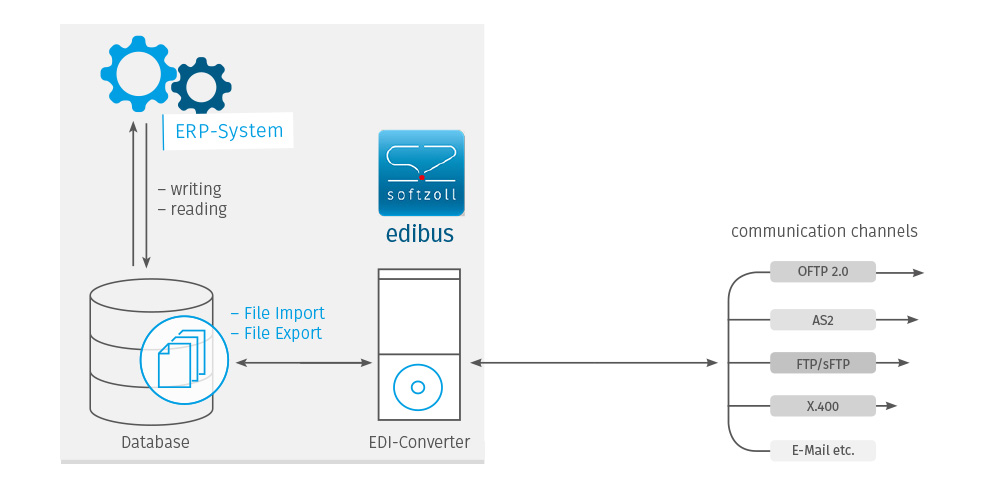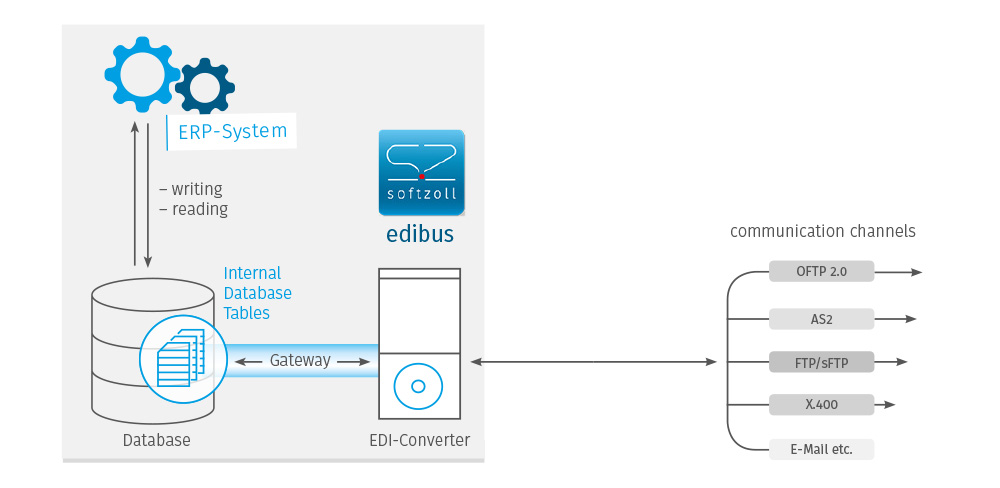Softzoll’s EDI converter system, edibus, is used by many customers and offers the full convenience and the functionality of a high-end data processing center solution as an extended in-house alternative. The system can be installed on Windows client and server operating systems, and is also available in a Linux version (by default: Cent OS, other Linux operating systems for a surcharge).
File-based interchange with Softzoll's in-house EDI converter, edibus.
Softzoll uses the same version that is used in the data processing center operation in the on-site solutions in the customers’ IT environments. Because there is no technical difference between the individual implementations (in-house, ASP, full service hosting) apart from the operating system, all components that have been purchased from Softzoll or are self-generated can be ported to another solution version.
Interchange over internal database table(s) using edibus, Softzoll's in-house EDI converter.
Customers who decide on an in-house installation receive an application that is completely suitable for the data processing center. It includes all components that Softzoll has developed on the basis of almost 30 years’ experience in the EDI field and has also deployed in highly complex EDI implementations. These components are generally only available at traditional suppliers at extremely high prices.
Both technically and commercially, the user can operate any number of subsidiaries and clients in the central EDI system. With us, you’ll look in vain for hair-splitting licensing models.
edibus has all communication modules on board right from the start. Whether the data interchange is to take place via e-mail, FTP/sFTP, X400, AS2, OFTP2, or HTTPS makes no difference. All required modules don’t have to be purchased individually but are integral components of our solution, and there is no dedicated maintenance contract per module either. Likewise, you can route files over all communication paths without conversion.
A primary error management system scans all processes and communication paths 24/7. If there is an error, there is an automatic e-mail alert which, if requested, can also be sent directly to our service desk.
edibus uses workflows to control the processing of all routine tasks. All components required in a processing routine are orchestrated in these workflows. The component-based structure ensures that individual modules can at any time be copied, adapted or interchanged case-specifically without compromising the workflow process or influencing the entire process (e.g., changing from X400 to AS2 communication, introducing a new ERP system).
edibus uses a relational database as its internal data hub. edibus is delivered by Softzoll with a MySQL database to avoid license costs. The data pool mapped in it has one consolidated level for each business process. Unlike traditional solutions, the data pool is not composed of a proprietary XML or ASCII structure (multiplying complexity!) but provides a uniform field assignment for each business process on the basis of ISO 9735. This strategy allows an essential data transformation or, if necessary, consolidation to be carried out directly at database level free of complex conversion logic (rule level). On request, this EDI data pool can be mirrored on any desired RDBMS (e.g., DB2, Oracle, MS SQL, Informix). Even populating multiple table and field parameters in a given ERP database structure can be done with ease.
Accessing the pool by browser, you have the possibility of monitoring and analyzing the evolution of the entire transaction at any time. The monitor not only grants access to the communication details but also offers direct download of the original EDI messages and the corresponding ERP files. Optionally, EDI documents can also be displayed in readable form as PDFs and/or be sent automatically by e-mail to any addressee. The transaction monitor is, moreover, multi-client capable; individual EDI partners and business processes can be assigned and visualized when needed, up to the level of the person in charge in the specialist departments.
edibus provides on-demand connectors (ERP templates) for all current or even unusual ERP systems at a fixed price. Alternatively, these can even be autonomously created using the software. Connecting different ERP systems, whether internally or on customer and supplier side, or migrating to a new ERP system can therefore be done in an uncomplicated way by implementing or replacing the corresponding connector. All EDI connections and the logics contained in them are not compromised by this but continue to be available. edibus supports even ERP-specific connection mechanisms (e.g., SAP tRFC or Infor semaphore control).
edibus reflects the fact that in current integration scenarios, the conversion between different formats (e.g., XML to EDIFACT, ASCII to XML) is becoming increasingly less important, and that the semantics (content characteristics) and the representation of logical structures play a significant role instead. The consolidation of the content of the data streams between ERP systems and their main addressees (customers, suppliers, ERP networks) is now the most important function of contemporary EDI infrastructure. The traditional approach to integrating this function assignment in the various conversion mechanisms or proprietary structures leads to an increase in complexity and prevents, among other things, recoverability. The consequence are individual projects that can only be realized by committing appropriate manpower and the expenses associated with it. edibus consolidates all business process-relevant data in a table-based relational database model. This approach allows data manipulations (e.g., partner-specific format conversions, creation of logistic packaging materials hierarchies) to be taken to a purely data-oriented level and the functionality created in this way to be ported over any number of connections.
edibus archives all process-relevant data (EDI file, corresponding ERP file, communication log and where applicable PDF files) by default according to a time frame that is to be freely defined in an internal archive directory, and if necessary also to an external drive or one unlocked by clearance. For audit-proof archiving, special archive workflows can carry out the processing of these data. Most professional archiving systems allow import of EDI-generated data via the COLD interface. To do this, the original EDI messages, the corresponding ERP file, the proof of transmission, and if applicable, the original EDI document in readable form (PDF) are provided with a manufacturer-specific index file. Depending on the manufacturer, these files are then delivered to the import directory of the archive system on the basis of a uniform assignment (e.g., naming).
This post is also available in DE.



